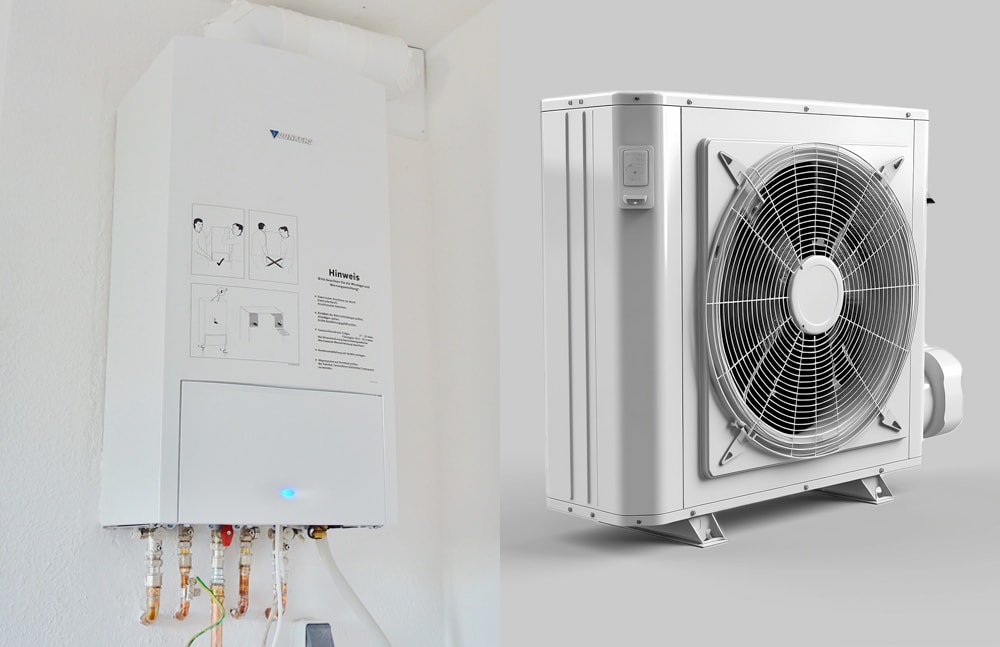When it comes to choosing a heating system, homeowners often find themselves deciding between boilers and heat pumps. Each system has its advantages and is suited to different climates and home structures. To make an informed choice, it’s essential to understand how these systems work, their pros and cons, and which is best suited for your specific needs.
1. Overview of Boilers
Boilers are traditional heating systems that use fuel (natural gas, oil, or electricity) to heat water. The hot water or steam then circulates through pipes to radiators or underfloor heating systems to warm the home.
How They Work:
- Boilers heat water using a combustion process (gas or oil) or electric heating elements.
- The heated water or steam travels through a closed-loop system, distributing warmth to different parts of the house.
- Once the water cools, it returns to the boiler to be reheated.

Types of Boilers:
- Combi Boilers: Provide both heating and hot water on demand.
- System Boilers: Use a separate hot water storage tank to supply multiple taps at once.
- Conventional Boilers: Include both a tank and cylinder, ideal for larger homes with high hot water demand.
Pros:
- Effective Heating: Excellent for consistent, powerful heat, especially in cold climates.
- Reliable Hot Water Supply: System and conventional boilers can provide ample hot water for multiple taps simultaneously.
- Long Lifespan: Well-maintained boilers can last 15-20 years or more.
Cons:
- Higher Fuel Costs: Gas and oil boilers can be costly to operate, depending on fuel prices.
- Space Requirements: Conventional and system boilers need space for tanks and cylinders.
- Carbon Footprint: Gas and oil boilers emit greenhouse gases, contributing to environmental concerns.
2. Overview of Heat Pumps
Heat pumps are an energy-efficient alternative that extracts heat from the outside air, ground, or water and transfers it indoors. They can also reverse the process to provide cooling during warmer months.
How They Work:
- Air-Source Heat Pumps: Extract heat from the air and use a refrigerant cycle to warm the indoor space.
- Ground-Source Heat Pumps: Use underground pipes to extract heat from the earth, which maintains a constant temperature year-round.
- Water-Source Heat Pumps: Draw heat from a nearby body of water.
Pros:
- Energy Efficiency: Heat pumps can achieve up to 300-400% efficiency, meaning they produce three to four times more energy than they consume.
- Dual Functionality: Provide both heating and cooling, making them versatile for year-round use.
- Eco-Friendly: Significantly lower carbon emissions compared to fossil fuel-based systems, especially when powered by renewable energy.
Cons:
- Higher Upfront Cost: Installation can be more expensive than a traditional boiler system, particularly for ground-source heat pumps.
- Performance in Cold Climates: Air-source heat pumps can struggle in extreme cold, although modern models have improved capabilities with supplemental heating options.
- Space Requirements for Ground-Source: Installing a ground-source heat pump requires a sizable yard for the underground loop system.
3. Comparing Efficiency and Costs
Energy Efficiency:
- Boilers: Modern condensing boilers can reach up to 90-95% efficiency. However, they still consume fossil fuels, impacting overall sustainability.
- Heat Pumps: Generally more efficient than boilers, with a Coefficient of Performance (COP) of 3-4. This means for every unit of energy consumed, 3-4 units of heat are produced.
Operating Costs:
- Boilers: The cost of running a boiler depends on the type of fuel. Natural gas is usually cheaper than oil but can still be pricier compared to electric options in areas with low electricity rates.
- Heat Pumps: Lower operating costs due to their high energy efficiency. However, electricity prices in your area can affect these savings.
Upfront Costs:
- Boilers: Typically more affordable upfront, with installation costs ranging from $3,000 to $5,000, depending on the type.
- Heat Pumps: Installation can cost $4,000 to $10,000 for air-source systems and $10,000 to $25,000 for ground-source systems, but rebates and incentives for energy-efficient systems may offset some of these costs.
4. Climate Considerations
Boilers:
- Best For: Cold climates where consistent, strong heat is necessary. They perform well in freezing temperatures and can be a reliable source of heat during long, harsh winters.
Heat Pumps:
- Best For: Mild to moderate climates where winter temperatures do not drop significantly below freezing. Air-source heat pumps are ideal for areas with less extreme winters, while ground-source heat pumps can work effectively even in colder climates due to the stable underground temperatures.

5. Space and Installation Requirements
Boilers:
- Space Needs: Conventional and system boilers require space for tanks and cylinders, while combi boilers are more compact.
- Installation Time: Typically less complex than a ground-source heat pump installation but may require significant piping work if a new system is being installed.
Heat Pumps:
- Space Needs: Air-source systems take up less space and are easier to install, while ground-source systems require significant outdoor space for trenching or boreholes.
- Installation Time: Ground-source systems require more extensive installation processes, which can take longer and disrupt outdoor spaces.
6. Environmental Impact
Boilers:
- Fossil Fuel Usage: While modern boilers are more efficient than older models, they still use fossil fuels, which contribute to carbon emissions.
- Electric Boilers: These have a smaller carbon footprint when powered by renewable energy but may be less efficient than heat pumps overall.
Heat Pumps:
- Lower Emissions: Use electricity, which can be sourced from renewables, making them an eco-friendlier option.
- Sustainability: Ground-source heat pumps have a higher initial environmental impact due to installation but offer long-term environmental benefits due to their efficiency and low emissions.

Conclusion
Choosing between a boiler and a heat pump depends on various factors, including climate, budget, home structure, and long-term energy goals. Boilers are ideal for homes in colder climates requiring consistent, powerful heat and those looking for a lower upfront cost. Heat pumps, on the other hand, offer energy efficiency, dual functionality, and lower long-term operating costs, making them suitable for homes in milder climates and those focused on sustainability.
